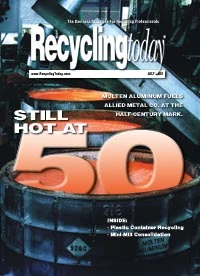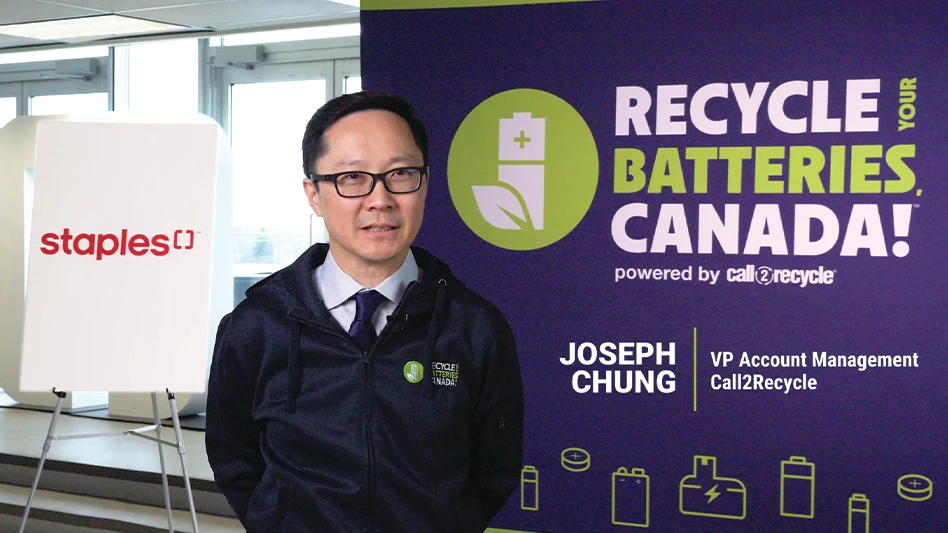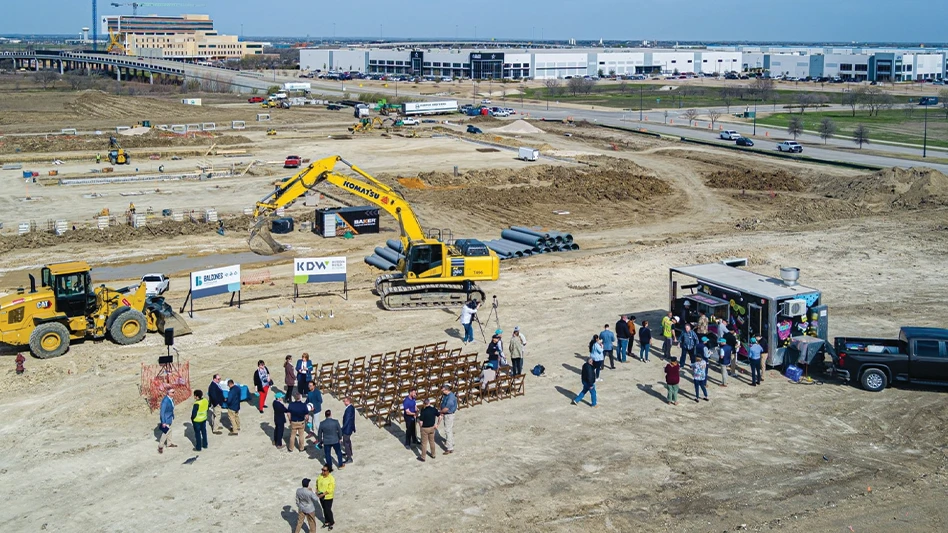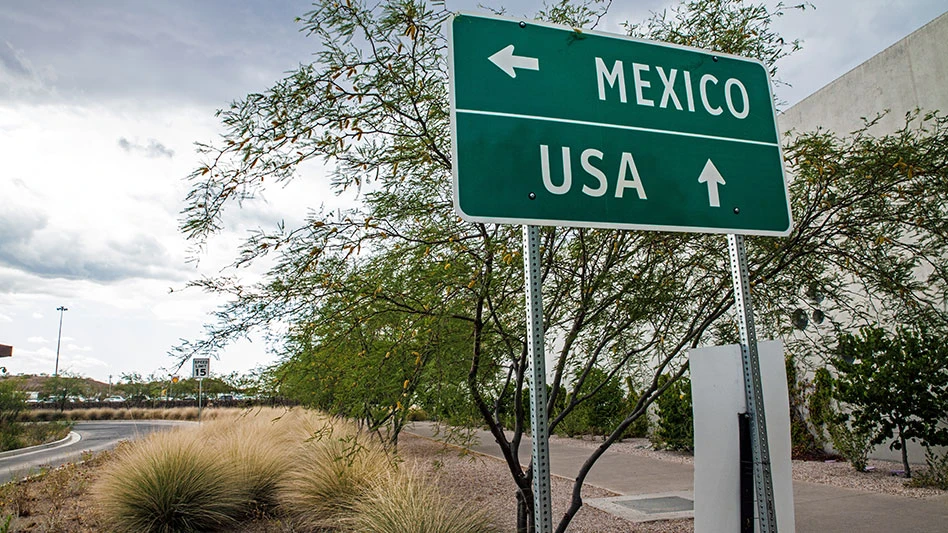RECYCLERS HONORED BY EPA
Four groups and one individual who championed recycling causes were among the 13 "Environmental Heroes" honored by Region 9 of the U.S. EPA. Region 9 covers California, Arizona, Nevada, Hawaii and Guam.
Honorees "have applied creativity, teamwork and leadership in addressing many of the area’s most pressing and complex environmental problems," Wayne Nastri, EPA regional administrator, remarks.
Region 9 Environmental Heroes with a recycling connection include:
• The Los Angeles Unified School District, which has developed a comprehensive waste diversion and recycling program for its nearly 1 million students and 80,000 employees. The district has expanded its mixed-paper recycling program to all schools and administrative offices.
• Tara Pike of Las Vegas was honored for expanding volunteer-supported environmental programs at the University of Nevada, Las Vegas (UNLV). She oversees all aspects of recycling at the university, staffing the program with more than 100 student volunteers each semester.
• Tyson Miller and the Recycled Products Purchasing Cooperative of Encinitas, Calif., were recognized for recycled-content purchasing efforts. Co-op participants have purchased more than 100,000 cases of 30 percent post-consumer recycled paper.
• Stanford University, Palo Alto, Calif., was honored for its Mercury Thermometer Replacement and Battery Recycling programs. The Household Battery Recycling Program redirects batteries from landfill waste streams to recycling facilities. EPA Region nine is hopeful the program can be replicated at other colleges, universities and large corporations.
• Ken Cleaveland and Mark Rumpler of San Francisco’s Building Owners and Managers Association (BOMA) were honored for their comprehensive "San Francisco Recycling and Hazardous Waste Guide for Commercial Property Owners and Managers." Approximately 220 office buildings participate in the association’s High Rise Recycling Program and divert more than 1,600 tons of paper monthly.
RUMPKE REVAMPS COLUMBUS MRF
More than $1 million in new sorting and processing equipment has been added to the Columbus, Ohio, material recovery facility (MRF) run by Rumpke Recycling.
The Cincinnati-based solid waste and recycling company has reconfigured the MRF to accept single-stream curbside materials collected in the Columbus area as well as from dozens of recycling drop-off recycling centers in central Ohio.
The new system includes additional conveyors, sorting stations and a disc screen installed by CP Manufacturing, National City, Calif. Rumpke now has the ability to send up to 24 tons of material per hour through its Columbus sorting line, according to Steve Sargent, general manager of the company’s recycling operations.
The plant’s managers hope to use the plant’s increased capacity to process materials that will be secured in cooperation with the Solid Waste Authority of Central Ohio (SWACO), Grove City, Ohio. The solid waste agency has recently assumed the leadership role for recycling efforts within the city of Columbus.
Although the city has not committed to curbside pick-up, SWACO has begun placing recycling drop-off boxes throughout the city. "Now residents can throw all recyclables into one drop box, providing a new level of convenience for Franklin County residents," says SWACO’s Michael Long. "We were able to do this because Rumpke made this commitment to expand its plant."
Sargent says the materials coming in from the drop boxes are fully commingled and are sometimes heavy on contaminants, although many of the contaminants are ultimately recyclable.
Plant manager Mark Gray says that only 10 to 12 percent of what comes in is considered residue and is directed to the landfill.
MICHIGAN RECYCLING COMPANY HONORED
The Michigan Recycling Coalition (MRC) has awarded Granger Recycling Center, Lansing, Mich., the Private Recycling Achievement Award. The 20th annual award to be conferred by the MRC was presented to Granger at the MRC convention in Pontiac, Mich., in early June.
Granger Recycling Chief Operating Officer Keith Granger says the company can claim a number of recycling-related firsts in its part of the Wolverine State. Granger claims the company created the first large-scale composting facility in mid-Michigan; opened the first 24-hour public drop-off center for recyclables in the state; and had the first operational landfill gas recovery project in the state.
Granger began diversifying from landfill to recycling operations in the early ‘70s with glass recycling centers. In 1989, the company completed a 50,000-square foot material recovery facility (MRF), where paper, plastics, glass, steel cans and aluminum cans are processed. The MRF, on the north side of Lansing, currently processes more than 1,500 tons of materials each month. The facility accepts source-separated and commingled loads.
"We truly believe in our recycling programs and work to make them not only a benefit to the environment, but sound economic programs also," Keith Granger, says. "We have a long history of providing innovative environmental management-related services to the mid-Michigan community."
ELECTRONICS LAWS SUMMARIZED
Legislation aimed at the mandated recycling or disposal of electronic scrap is the topic of a new report from Raymond Communications Inc., College Park, Md. The report, "Electronics Recycling: What to Expect from Global Mandates," summarizes legislation passed or discussed globally and in the U.S.
According to the report, nearly 30 countries may have electronics take-back laws on the books within the next five years. In the U.S., electronics manufacturers are trying to work with environmentalists, municipal officials and the solid waste and recycling industries to develop a recycling and disposal system for electronic appliances.
The report contains details of laws and initiatives in 16 nations in Europe and Asia, as well as a summary of legislation in Latin America.
Also part of the report are more than 30 case histories of how different electronics firms are addressing the issues of product take-back, recycling, and designing for the environment.
For those interested in the U.S. market, the report includes exclusive state surveys on electronics recycling regulations and the electronics recycling infrastructure in various states. Results of pilot studies conducted in different states and by different manufacturers are also included.
For more information or to order the report, Raymond Communications can be contacted through its Web site, www.raymond.com.
|
Correction |
|
In the June Recycling Today feature “Setting a Higher Standard,” an incorrect figure for the number of computer monitors purchased in the U.S. annually was given. The correct figure is 50 million new monitors annually. Additionally, the introductory reference to America Chung Nam executive vice president Peter Wang was inadvertently omitted from the June feature “Setting Sail.” Recycling Today regrets the omission. |
Get curated news on YOUR industry.
Enter your email to receive our newsletters.

Explore the July 2002 Issue
Check out more from this issue and find your next story to read.
Latest from Recycling Today
- SABIC’s Trucircle PE used for greenhouse roofing
- Hydro to add wire rod casthouse in Norway
- Hindalco to invest in copper, aluminum business in India
- Recycled steel price crosses $500 per ton threshold
- Smithers report looks at PCR plastic’s near-term prospects
- Plastics association quantifies US-EU trade dispute impacts
- Nucor expects slimmer profits in early 2025
- CP Group announces new senior vice president






